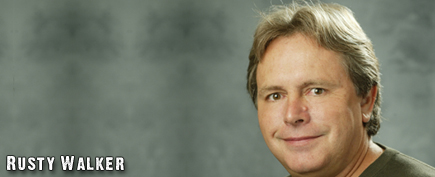Getting To Know Rusty Walker
By Gary Voorhies
© 2006 CMA Close Up News Service / Country Music Association, Inc.
Radio remains king when it comes to reaching Country Music fans. The business is competitive, with more than 2,000 radio stations in the United States playing Country Music. Many stations turn to independent radio consultants to gain an edge. The consultants help develop listener-friendly play lists, personalities, promotions and programs.
Rusty Walker, President/Owner of Rusty Walker Programming Consultant, Inc., is one of the leading consultants in Country radio. He has helped shape more than 500 stations since 1983. And he does it all from the rural Mississippi town of Luka, 22 miles from Corinth, where he first hosted a radio shift when he was 16 years old.
How did a small town boy become a leader in his field, one so prominent that he was named Billboard magazine's "Country radio Consultant of the Year" for seven consecutive years?
It started when a disc jockey took the time to introduce a young Walker to the magic of radio.
"When I was 7, my mom took my little brother and me to our local radio station. It was WCMA in Corinth, Miss.," he remembered. "The on-air DJ, the late Buddy Bain, let a destitute poor boy flip a switch to start a record on his radio show. That unselfish and giving act set in motion a chain of events that led me to become a Country radio programmer."
By the time Walker turned 16 in 1968, he was hosting his own show on WWTX/Corinth.
"I was the 7 PM to midnight DJ, and on my first night on the air, I called Johnny Duncan 'Junky Duncan' and Nat Stuckey 'Nat Stookey.' Boy was I nervous that night."
He went on to work at Top 40 and CHR stations in various cities in Alabama and Mississippi. Next, he became PD and an on-air personality at a series of stations. During his tenure at WZZK/Birmingham, Ala., Walker was the highest rated FM DJ in America, according to Arbitron ratings released for fall 1981.
Walker was soon lured away to become a corporate programming executive for Sconnix Broadcasting and then Katz Broadcasting.
Eventually, Walker came to a revelation.
"When I first got into radio, I was a consultant to my bosses and supervisor," he said. "When I became a manager, I was a consultant to my bosses and supervisors and to my employees, too. (I realized) I'd never been anything but a consultant."
Now after 23 years as a consultant, Walker has a self-mandated limit of about 100 clients at a time.
He partners with station personnel to help their stations be more successful, on air and off. The prescription varies from market to market, but his commitment is consistent. "I'll do whatever I can to increase ratings, raise gross revenue, improve the bottom line and ease operational burden," he said.
Walker starts at the same place with every station. "Determine the elements of importance to your particular target audience and give those elements to them at least once every fifteen minutes," he said. "This is the basic formula."
Lisa McKay, PD at top-rated WQDR/Raleigh, N.C., where Walker has consulted for more than four years, is a believer.
"We both love great radio," she said of Walker. "It is helpful to both my team and to our management team to have a guy who has seen and done it all. He is the voice of wisdom and reason."
Business expertise aside, Walker is a self-proclaimed "music nut" who loves many music genres and Country artists. But his tastes do not necessarily dictate his advice to stations, nor is his advice limited to music. "Our primary responsibilities are to provide strategic development, such as helping a station decide what KIND of Country Music they should play, develop proper operating systems, provide recruiting and staffing assistance, develop marketing plans and assist in the budget process," he said.
Walker relies on consumer surveys for some of the answers. "I cannot really judge a song commercially until I've gotten feedback from the end consumer of the product, the Country Music listener," Walker said.
He voices appreciation for Bob Pittman and Ed Salamon, two of the pioneers who introduced this research concept to the Country Music industry.
"Radio is no different than any other business. It is smart to listen to your customers," said Salamon, CRB Executive Director.
Walker says the method is part of accommodating the tastes of local listeners, which in turn is the key to overcoming many of the challenges facing stations today.
And while he has earned respect as a consultant, Walker's admiration centers on two other occupations. "There are no more noble secular pursuits in America today than either programming a great Country radio station or producing a great Country song," he said.
With dozens of stations relying on his help, Walker has plenty to keep him busy. Still, he gives his time to serve as CRB Director and as a member of the CMA Board.
Serving on the CMA Board has given Walker insight.
"As a CMA Board member, I'd like to help radio people understand both the relevance and the importance of having an industry trade organization that exists specifically to promote a singular genre of music," he said. "The CMA initiatives are beneficial for all aspects of the Country Music community."
As Walker, named "Programmer of the Century" by Radio & Records, approaches his fourth decade as a radio professional and more than two decades as a radio consultant, his focus is clear.
"I'd like to be as responsible for creating and motivating passionate radio programmers as Buddy Bain was for lighting the fire within me," he said. "I'd like to be known as a motivator and mentor first and as a marketer and strategist, second."


July 11, 2006
© John Russell / CMA